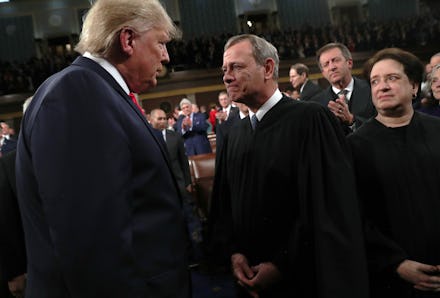The Supreme Court just ruled New York prosecutors can see Trump's tax returns

In one of the most anticipated legal decisions of the term, the United States Supreme Court on Thursday ruled that President Donald Trump cannot keep his tax records secret from Manhattan district attorney Cy Vance.
The 7-2 ruling in Trump v Vance comes as a major blow to the president who, for years, has gone extraordinarily out of his way to ensure his tax filings remain hidden from public view. Those efforts were effectively quashed on Thursday when Chief Justice John Roberts, writing for the court majority, stated plainly that:
Two hundred years ago, a great jurist of our Court established that no citizen, not even the President, is categorically above the common duty to produce evidence when called upon in a criminal proceeding. We reaffirm that principle today and hold that the President is neither absolutely immune from state criminal subpoenas seeking his private papers nor entitled to a heightened standard of need.
Put simply, the president is not above the law when it comes to the court demanding to see his tax returns.
Thursday's ruling stems from a longstanding fight between Trump and the Manhattan District Attorney's office, regarding the president's alleged financial crimes, including accusations of his paying hush money to a number of women with whom is accuse of having affairs.
The court's decisive blow to Trump's efforts to keep his taxes hidden does not, however, mean that the public will see his returns anytime soon, if at all. Instead, it means that the President cannot keep his taxes from an empaneled grand jury, which is secret. Notably, the court did not rule that Trump must turn his taxes over to U.S. House of Representatives, which had also requested the documents. Rather, the congressional demands for Trump's taxes are now remanded back to the lower court, meaning that even if House Democrats eventually prevail in their efforts to obtain the returns, it will be long after the 2020 election takes place.
Notably, only conservative Justices Clarance Thomas and Samuel Alito dissented from the court's ruling. Both of Trump's hand-picked appointed to the bench — Brett Kavanaugh and Neil Gorsuch — sided with the majority opinion.